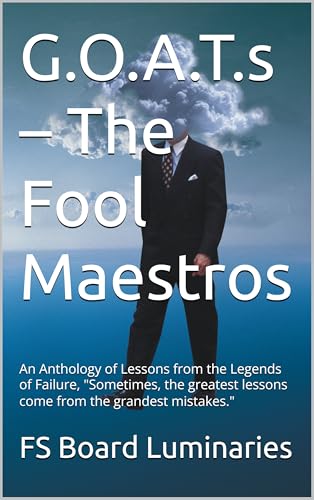Interview with Faizal Shah Kuttiyil (FS Board Luminaries), Author of G.O.A.T.s – The Fool Maestros
26 Mar 2025
What’s the story behind the story? What inspired you to write G.O.A.T.s – The Fool Maestros?
Every entrepreneur, business leader, and investor loves studying success stories—but the truth is, we often learn more from failures than from victories. I’ve always been fascinated by corporate collapses, not because of the downfall itself, but because of the lessons they leave behind. Time and time again, history has shown us that hubris, mismanagement, and weak risk culture are often the biggest threats to businesses—not the economy, not the competition. This book was born out of a simple but powerful question: Why do even the biggest companies, with the smartest people and the best resources, still fail?
What Inspired Me? The Pattern of Repeated Mistakes – From Enron to WeWork, Kodak to Lehman Brothers, I noticed that leaders and companies keep making the same mistakes—again and again. The Illusion of Invincibility – Many of these companies ignored risks, resisted change, and assumed they were untouchable. They forgot that even the most powerful can fall overnight. A Cautionary Guide for Today’s Leaders – I wanted to create a practical, eye-opening guide that warns leaders, entrepreneurs, and investors about the dangers of unchecked ambition, poor governance, and reckless decision-making powered by Arrogance & Ego – The A.G.E factor.
“The Influence of The Great Dictator Speech”: The final speech from The Great Dictator by Charlie Chaplin has always resonated with me, particularly these words: “We think too much and feel too little. More than machinery, we need humanity. More than cleverness, we need kindness and gentleness.” Corporate failures—whether Dumbell’s Bank, WeWork, Enron, or Lehman Brothers—aren’t just about bad numbers; they’re about losing sight of ethics, humility, and purpose. Many leaders became so obsessed with power and profits that they forgot the very people and principles that built their companies. They focused too much on greed, too little on integrity. They thought too much about short sighted growth, too little about sustainability.
The Role of Risk Culture in Business Downfalls: At the core of these failures is a toxic risk culture—a belief that rules don’t apply, warnings can be ignored, and the market will always forgive arrogance. Dumbell’s Bank – Assumed financial manipulation could go unnoticed. Enron – Created a culture where fraud was not just tolerated, but nurtured. WeWork – Ignored basic financial discipline in favor of hype. In every case, leadership failed not because they lacked intelligence, but because they lacked accountability.
What’s the Key Takeaway?: This book isn’t just about failure—it’s about learning from history so we don’t repeat it. Whether you’re a startup founder, CEO, Board Member, investor, professional, or student, G.O.A.T.s – The Fool Maestros gives you a front-row seat to history’s biggest business disasters—and the lessons we all need to remember. Don’t repeat history—learn from it!
If you had to pick theme songs for the main characters of G.O.A.T.s – The Fool Maestros, what would they be?
The Book’s Overall Theme Song is “Mad World” by Gary Jules (Tears for Fears Cover) Why? Because this book is about the madness of corporate arrogance, greed, and self-destruction. The same mistakes keep happening over and over again—it’s a mad world. “And I find it kind of funny, I find it kind of sad…”
What’s your favorite genre to read? Is it the same as your favorite genre to write?
How Do These Classics Align with the Lessons of Corporate Failure? Jack Welch (Winning, Straight from the Gut) What It Teaches: Jack Welch, the legendary CEO of General Electric, focused on performance-driven leadership, cutting inefficiencies, and constantly adapting to change. Connection to Failure: Many companies in G.O.A.T.s failed due to complacency, lack of innovation, and bureaucratic inertia. Blockbuster and Kodak resisted change, assuming they were too big to fail. Lesson: No company is invincible—only adaptive leadership ensures survival. Lee Iacocca (Iacocca: An Autobiography) What It Teaches: Lee Iacocca turned around Chrysler from near bankruptcy through bold leadership, strategic thinking, and decisive action. Connection to Failure: Companies like WeWork and Enron had reckless leadership, unlike Iacocca’s disciplined approach. Chrysler survived because of strategic risk-taking; Lehman Brothers collapsed due to reckless risk-taking. Lesson: Strong leadership and risk management separate success from failure. Do Not Count Your Chickens Before They Hatch (by Arindam Chaudhuri) What It Teaches: This book focuses on strategic planning, leadership, and the real meaning of success—not just short-term gains. Connection to Failure: Many companies in G.O.A.T.s expanded too fast, assuming success was guaranteed. Work counted its chickens before they hatched, expanding aggressively with no sustainable profit model. Enron thought it could manipulate the market forever—until the truth caught up. Lesson: Success requires planning, execution, and a reality check—hype alone won’t sustain a business. Tricker’s Corporate Governance What It Teaches: Corporate governance ensures transparency, ethical leadership, and risk management—factors many fallen companies ignored. Connection to Failure: Lehman Brothers collapsed due to poor risk management. Enron’s fraudulent leadership thrived because of weak corporate governance. Lesson: Corporate governance isn’t just a formality—it’s essential for survival. You Can Win (by Shiv Khera) What It Teaches: Success is built on discipline, mindset, and ethical decision-making—not shortcuts or deception. Connection to Failure: Companies like Enron and WeWork prioritized quick wins over long-term success. If they had built a foundation of sustainable success, they might have survived. Lesson: Real success is built over time, not overnight. The Intelligent Investor (by Benjamin Graham) What It Teaches: This book teaches value investing, risk management, and avoiding speculation-driven bubbles. Connection to Failure: Lehman Brothers ignored fundamental investing principles, leading to reckless financial moves. WeWork was grossly overvalued ($47B!) despite financial instability. Lesson: A business without strong financial fundamentals is doomed to fail. Final Takeaway: The Books That Could Have Saved These Companies Had the CEOs of Enron, WeWork, Kodak, and Lehman Brothers followed the principles in these books, they might have avoided disaster. Great leadership, strategic planning, and corporate governance aren’t optional—they’re the difference between survival and collapse. Want to see what happens when companies ignore these lessons? Get your copy of G.O.A.T.s – The Fool Maestros today!
What books are on your TBR pile right now?
The Bold Moves That Backfired – A Reading List of Corporate Misadventures: Some decisions change the game. Others change the scoreboard—in the worst way possible. Throughout history, some of the boldest business decisions were hailed as visionary—until they unraveled into case studies of ambition gone wrong. These stories of power, strategy, and unexpected consequences reveal what happens when big risks meet bigger miscalculations.
What scene in your book was your favorite to write?
If I had to pick, Chapter 1: Clodhopper’s Bank (1900)—a thinly veiled satire of the Dumbell’s Bank collapse—was by far my favorite. It’s a perfect storm of overconfidence, financial recklessness, and small-town chaos, all unfolding in a way that feels ridiculous—but is shockingly real. The Scene: When Clodhopper’s Bank Collapsed Clodhopper’s Bank was the crown jewel of the Isle of Blunder, built on loud promises and even louder waistcoats. Archibald P. Clodhopper III, the bank’s eccentric founder, looked like he’d stepped straight out of a portrait titled “Confidence Man with Mustache.” He convinced an entire town that their money was safer than a bishop in a sermon. Spoiler: It wasn’t. Prelude to the Collapse The first whisper of disaster came from none other than Mrs. Mabel Butterworth, the local oracle of bad news. “I heard Clodhopper’s out of money!” she announced while buying turnips. By lunchtime, the town had entered full-scale panic mode. The Great Bank Run of 1900 Leading the charge was Big Gus, the local fisherman, who pounded on the bank doors yelling: “Archie, you scoundrel, where’s my savings?!” Inside, the clerks weren’t helping customers—they were sneaking out the back with bags of coins. And Archibald? Nowhere to be found. Rumor had it he was on a “business trip” (translation: hiding in a pub two towns over). By nightfall, the bank was officially closed, families were broke, and Big Gus was still tangled in his fishing net after a failed attempt to break down the doors. Why Was This My Favorite Scene? Because this is how financial disasters truly happen—not only with fraud and corruption, but also with delusion, overconfidence, and blind faith in bad leaders. It’s absurd. It’s chaotic. It’s frighteningly real. Lessons from Clodhopper’s Bank (aka Dumbell’s Bank) Don’t Bet the Farm – Or, in this case, don’t bet the bank on swamp land no one wants. Honesty is the Best Policy – Unless you’re Archibald, in which case, at least don’t disappear. Have a Backup Plan – Preferably one that doesn’t involve fleeing the country. Risk Culture: A Warning for the Ages The collapse of Dumbell’s Bank left a deep scar on financial history. But in the Isle of Blunder, the lesson was much simpler: “Never trust a man with a fancy mustache and no plan.” Want to read more ridiculous-but-true tales of financial catastrophe? Grab your copy of G.O.A.T.s – The Fool Maestros today!
Do you have any quirky writing habits? (lucky mugs, cats on laps, etc.)
If I had quirky writing habits, they’d probably be something like this: Lucky Mug of Corporate Chaos – A coffee mug that says “This meeting could have been an email” fuels my deep dives into business failures and risk culture disasters. Imaginary Cat Named “Short Sell” – If I had a cat, it would sit on my lap while I write about companies that went bankrupt because they ignored reality. (Short Sell would naturally knock over my notes and predict financial collapses better than some CEOs.) Stock Market Mood Lighting – I keep an old ticker tape printout of Enron’s final stock price nearby as a reminder of what unchecked ambition looks like. Deep Dive Rituals – I tend to obsessively track down obscure corporate scandals, sometimes ending up in hundred-year-old newspaper archives just to understand why one bad decision spiraled into a billion-dollar failure.
Do you have a motto, quote, or philosophy you live by?
“Learn from history, or be history.” Business failures, corporate collapses, and leadership disasters aren’t just stories—they’re warnings. The same mistakes keep happening, just with different names and bigger numbers. Or, as Warren Buffett once said: “What we learn from history is that people don’t learn from history.” So, whether it’s Enron, WeWork, Dumbell’s Bank, or Clodhopper’s Bank, the lesson remains the same: Arrogance, poor risk culture, and ignoring reality will always lead to disaster. Bonus Quote: “Never trust a man with a fancy mustache and no plan.” – Every townsperson after the Clodhopper’s Bank collapse.
If you could choose one thing for readers to remember after reading your book, what would it be?
If Readers Remember One Thing from G.O.A.T.s – The Fool Maestros, It Should Be This: “Success teaches you what works. Failure teaches you what lasts.” The biggest corporate disasters—Enron, WeWork, Dumbell’s Bank, Kodak, Lehman Brothers—weren’t inevitable. They happened because leaders ignored warning signs, believed their own hype, and thought they were too big to fail. The lesson? History repeats itself only when people refuse to learn from it. The smartest leaders, entrepreneurs, and investors study failure as much as they study success—because understanding what NOT to do is just as valuable as knowing what works. So, if you take one thing from this book, let it be this: No company is invincible. No leader is infallible. But every failure leaves behind a lesson—if you’re willing to learn. Want to dive into the greatest business failures of all time? Get your copy of G.O.A.T.s – The Fool Maestros today!
Faizal Shah Kuttiyil (FS Board Luminaries) is the author of the new book G.O.A.T.s – The Fool Maestros
Connect with Faizal Shah Kuttiyil (FS Board Luminaries)
Author Site
Sign up for our email and we’ll send you the best new books in your favorite genres weekly.
Related
meghan
Recommended Posts

Twisty New YA Books You Won’t Be Able to Put Down
02 May 2025 - Books to Read if You Like..., News, Young Adult


